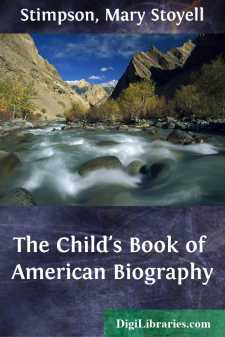Categories
- Antiques & Collectibles 13
- Architecture 36
- Art 48
- Bibles 22
- Biography & Autobiography 813
- Body, Mind & Spirit 142
- Business & Economics 28
- Children's Books 15
- Children's Fiction 12
- Computers 4
- Cooking 94
- Crafts & Hobbies 4
- Drama 346
- Education 46
- Family & Relationships 57
- Fiction 11828
- Games 19
- Gardening 17
- Health & Fitness 34
- History 1377
- House & Home 1
- Humor 147
- Juvenile Fiction 1873
- Juvenile Nonfiction 202
- Language Arts & Disciplines 88
- Law 16
- Literary Collections 686
- Literary Criticism 179
- Mathematics 13
- Medical 41
- Music 40
- Nature 179
- Non-Classifiable 1768
- Performing Arts 7
- Periodicals 1453
- Philosophy 64
- Photography 2
- Poetry 896
- Political Science 203
- Psychology 42
- Reference 154
- Religion 513
- Science 126
- Self-Help 84
- Social Science 81
- Sports & Recreation 34
- Study Aids 3
- Technology & Engineering 59
- Transportation 23
- Travel 463
- True Crime 29
The Child's Book of American Biography
Description:
Excerpt
GEORGE WASHINGTON
No one ever tells a story about the early days in America without bringing in the name of George Washington. In fact he is called the Father of our country. But he did not get this name until he was nearly sixty years old; and all kinds of interesting things, like taming wild colts, fighting Indians, hunting game, fording rivers, and commanding an army, had happened to him before that. He really had a wonderful life.
George Washington was born in Virginia almost two hundred years ago. Virginia was not a state then. Indeed, there were no states. Every colony from Maine to Georgia was owned by King George, who sent men from England to govern them.
At the time of George Washington's birth, Virginia was the richest of the thirteen colonies. George's father, Augustine Washington, had a fine old southern farmhouse set in the midst of a large tobacco plantation. This farm of a thousand acres was on the Potomac River. The Washington boys (George had two older brothers and several younger ones) had plenty of room to play in, and George had a pony, Hero, of his own.
George was eleven years old when his father died, and his mother managed the plantation and brought up the children. George never gave her any trouble. He had good lessons at school and was willing to help her at home. He was a fine wrestler and could row and swim. Indeed, he liked the water so well, that he fancied he might lead the life of a sailor, carrying tobacco from the Potomac River to England. He heard stories of vessels meeting pirates and thought it would be very exciting. But his English uncle warned Mrs. Washington that it would be a hard life for her son, and she coaxed him to give up the idea.
George had shown that he could do the work of a man on the farm when he was only sixteen. He was tall and strong and had a firm will. He had great skill in breaking colts and understood planting and harvesting, as well as tobacco raising. Being good at figures, he learned surveying. Surveying is the science of measuring land so that an owner will know just how much he has, how it lies, and what it adjoins, so that he can cut it into lots and set the measurements all down on paper. George was a fine land surveyor, and when he went to visit a half-brother, Lawrence Washington, who had a beautiful new home on the Potomac, which he called Mount Vernon, an English nobleman, Lord Fairfax, who owned the next estate, hired George to go all over his land in Virginia and put on paper for him the names of the people who lived in the Shenandoah valley, the way the roads ran, and the size of his different plantations. He really did not know how much land he owned, for King Charles the Second had given an immense amount of land to his grandfather. But he thought it was quite time to find out, and he was sure George Washington was an honest lad who would do the work well.
Lord Fairfax spoke so highly of George that he was made surveyor of the colony. The outdoor life, and the long tramps in the sunshine made George's tall frame fill out, and he became one of the stoutest and handsomest young men in the colony.
Lawrence Washington was ill and had to go to a warmer climate, so he took George with him for help and company. Lawrence did not live and left the eight-thousand-acre estate, Mount Vernon, to George. This made George Washington a rich man at twenty.
The French and English began to discover that there was fine, rich land on either side of the Ohio River, and each laid claim to it. Now the Indians had been wandering through the forests of that region, camping and fishing where they chose, and they felt the land belonged to them. They grew ugly and sulky toward the English with whom up to this time they had been very friendly....


